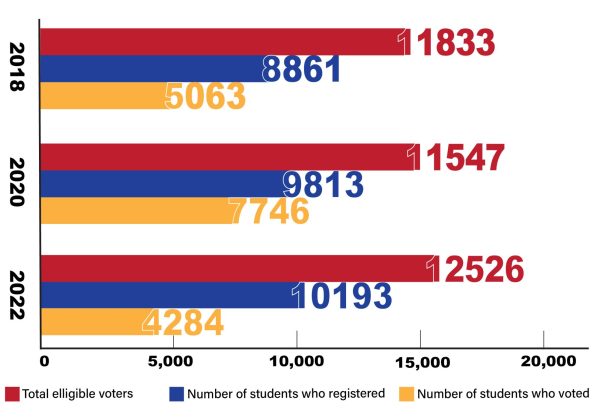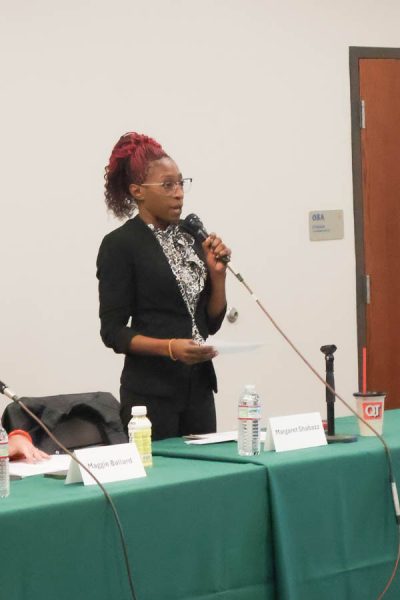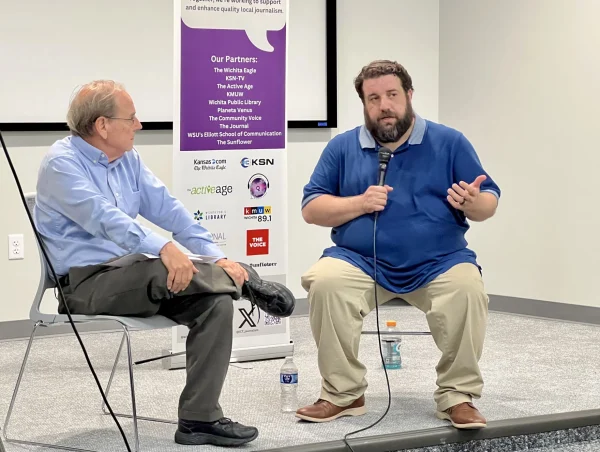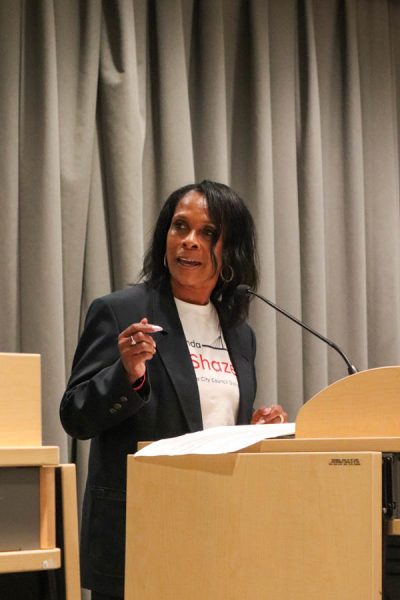Graduate student discusses Neurodiversity and life with an Autism Spectrum Disorder
Meghan Schmitt speaks at Brown Bag” Panel Discussion. The panel was held by Wichita State’s Neurodiversity during ASD Awareness Week.
Meghan Schmitt is a Wichita State graduate student currently working on her second Master’s degree in the Communication Sciences and Disorders, Speech-Language Pathology program. As part of the program, Schmitt works at WSU’s Speech-Language Pathology clinic as a student clinician. She’s working with people with a variety of communication disorders, including Autism Spectrum Disorders (ASD).
After receiving a bachelor’s degree from the University of Kansas and a Master’s degree from Colorado State University, both in chemistry, Schmitt began another Master’s at WSU. While enrolled, she was diagnosed with autism.
According to Autism Speaks, autism, or autism spectrum disorder, refers to, “a broad range of conditions characterized by challenges with social skills, repetitive behaviors, speech, and nonverbal communication.”
The CDC says autism affects an estimated 1 in 59 children in the United States.
Because autism is a spectrum disorder, each person with autism has a distinct set of strengths and challenges.
For Schmitt, it wasn’t until adulthood that she learned she’s officially on the spectrum, but she’d suspected it for years, she said.
“When I came here, I hadn’t actually even been officially diagnosed,” Schmitt said. “That’s a pretty common problem with women — especially women with average or above average intelligence.
“Every one of the tests were all normed on boys and a specific type of boy. And so it’s very common to miss it in girls growing up and even into adulthood, or to not notice it at all because they’re just like the quiet girl in class who does okay in school,” Schmitt said. “So why would we pay any attention to the fact that she has these other traits?
“The kid who just talks endlessly about trains is probably going to get noticed,” she said.
But she said the kid who can look you in the eye and shake your hand isn’t going to stand out. And if they’re female, it’s even less likely that people will notice any ongoing traits of ASD.
Women with ASD need support, understanding, and acceptance, Schmitt said.
They sometimes end up getting diagnosed with depression or anxiety disorders. Schmitt said she’s heard of people getting diagnosed as bipolar also.
“They don’t actually have any of these things, or if they do, it’s secondary to the autism, but the autism doesn’t ever get detected sometimes until they themselves start looking into it when they are a lot older,” she said.
For Schmitt, if it hadn’t been for her curiosity and persistence, she might still be undiagnosed.
“When I was a teenager was the first time I really found out about it at all. And at that point, there was pretty much no information about girls, so everything was boy specific,” Schmitt said. “I was like, ‘This really kind of fits me, but not totally.’ I mean, I can have a conversation with a person.”
But Schmitt paid close attention to articles that came out on the topic over the years.
“I became pretty convinced that I had it,” she said.
Schmitt said she was hesitant about seeking a diagnosis at first.
“You always hear about people who try to tell someone and then get a misdiagnosis, and then get put on some very strong medication that’s not appropriate for them at all, or just get sent around to various psychologists,” Schmitt said. “So I was afraid to go that route until after I came here.”
Because ASD was a common topic in WSU’s Speech-Language Pathology program, Schmitt got up the nerve to mention to a professor what she suspected.
“I think this might apply to me,” she said, not really expecting it to go anywhere.
It did go somewhere. Schmitt was diagnosed with ASD as a graduate student.
Getting the diagnosis was a relief, she said.
“Not everything I’ve had trouble with is 100% my fault. My brain is different. And not different in a bad way,” Schmitt said. “Being diagnosed didn’t change anything about me. That’s how I’ve always been, and I like how I’ve always been, so why would I be upset about how I’ve always been being partially influenced by being autistic?
“I like my brain, so I’m not going to hate something that is part of me.”
Schmitt said she’s trying to figure out how best to advocate for what she needs academically. In that sense, she’s no different than any other student. Knowing how to say, “This is what I’m having trouble with; this is where I need help,” is important for all students, but something that people with autism sometimes struggle with, she said.
According to Understood.org, Neurodiversity means, “that brain differences are just that: differences. So conditions like ADHD and autism aren’t “abnormal.” They’re simply variations of the human brain.”
Schmitt said one of the goals of increased dialogue around Neurodiversity at WSU is “to try to improve services at the university level, because really all that you can get is extended time on tests or a note taker.”
“For some people, that’s very helpful. But for some people, that’s not what they need.”
She said she did get some extra practice interviews that she found helpful. The challenge is trying to figure out what would be useful for herself and others with ASD in the future. That’s one of the things that participants in WSU’s Neurodiversity Awareness Week discussed.
The 2019 Neurodiversity Awareness Week: Autism Spectrum Disorder offered a series of events during the week of April 22. Schmitt took part in a panel discussion on April 24.
“Our goal is to just give people a better perspective of, ‘We’re like this, we have these traits, and we’re also people — just normal people going to college,’” Schmitt said.
She said she wants to give people a better understanding of what autism can look like.
As for stereotypes about ASD that Schmitt faces, she said some of them don’t show up in her daily life because many people don’t realize she’s on the spectrum.
“If you didn’t know me over a long period of time, or try to talk to me in specific circumstances, you wouldn’t even know that I had it,” Schmitt said.
But that’s a double-edged sword, she said.
“People will assume that I’ll be normal in every circumstance, and then all of a sudden, I do something that I have an unusual amount of trouble understanding for a reason that they can’t determine. I could tell them why, but of course, they don’t ask,” Schmitt said.
“On the other hand, if I went up and met someone and said, ‘Hi, I have autism,’ they will assume that I am completely incompetent at everything or maybe that I have like one special skill — maybe I’m fantastic at math and can’t do anything else.”
She said the context in which she meets someone influences the assumptions they make about her.
“People assume that it’s all one or all the other — you’re either totally normal or totally impaired and weird and will never be anything else,” Schmitt said.
The hardest presumption is that people assume that those with ASD wish they weren’t the way they are, Schmitt said. That’s not always true. She’s happy with who she is.
“It’s not that I think that I am perfect,” Schmitt said. “But me improving myself does not mean me becoming neurotypical — neurotypical being a person who just has normal neurological development. That’s not my goal.”
Schmitt said she hopes that with greater awareness of ASD will come greater acceptance.
“A lot of the neurodiversity movement is people saying, ‘My goal is not to become a normal person. My goal is just to become a better me.’”

Audrey Korte was a reporter and the opinion editor for The Sunflower. She hosted The Sunflower News Podcast.











